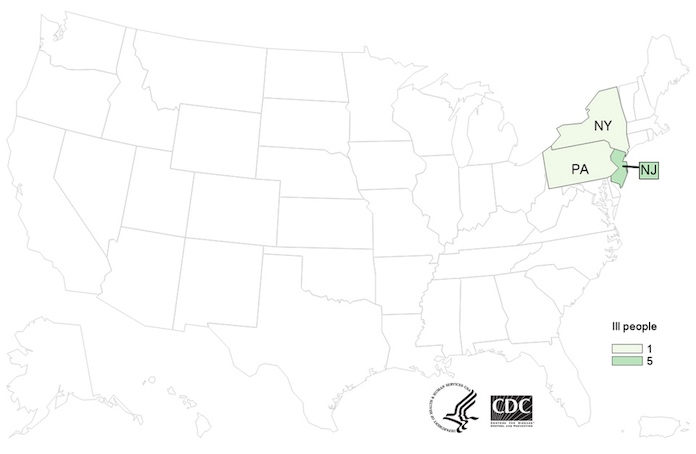The Centers for Disease Control and Prevention has split the large Salmonella outbreak linked to different imported Maradol papayas into four separates outbreaks. Each outbreak is inked to papayas imported from four different farms in Mexico. This outbreak, which has sickened 7 people in 3 states, was caused by Salmonella Urbana.
 Illnesses in this outbreak started on dates ranging from July 23, 20107 to August 14, 2017. Four people have been hospitalized. No deaths have been reported. The case count by state is: New Jersey (5), New York (1), and Pennsylvania (1).
Illnesses in this outbreak started on dates ranging from July 23, 20107 to August 14, 2017. Four people have been hospitalized. No deaths have been reported. The case count by state is: New Jersey (5), New York (1), and Pennsylvania (1).
Illnesses started on dates ranging from July 13, 2017 to August 14, 2017. Four people have been hospitalized in this outbreak. No deaths have been reported. Ill people range in age from less than 1 year to 57, with a median age of 1. Four of the patients are female. Among six people interviewed, 5 are of Hispanic ethnicity.
This is a very high hospitalization rate for a Salmonella outbreak. This could be because the bacteria are antibiotic resistant, they could be very virulent, or the fruit could have been contaminated with a lot of bacteria.
Epidemiologic and traceback evidence indicates that Maradol papayas from the El Zapotanito farm in La Huerta, Mexico are the likely source of this outbreak. Those papayas have been recalled.
Since it takes an average of 2 to 4 weeks for an illness to be diagnosed and reported to public health officials, illnesses that occurred after August 15, 2017 may not be included in this outbreak. Salmonella infections are reportable health conditions.
Because of the initial outbreak, FDA has increased testing of papayas from Mexico to see if there are fruits from other farms that are also contaminated. Investigators compared pulsed field-gel electrophoresis and whole genome sequencing results of Salmonella isolates from papayas to isolates from patients in the PulseNet Datta base. The results from these tests provide more evidence that the people in this outbreak were sickened from eating contaminated Maradol papayas.
The FDA believes that no shipments of papayas from this particular farm are on the market in the United States because they are past their shelf life. The contaminated papayas were destroyed, and that shipment was not distributed for sale in the United States. Papayas from El Zapotanito farm were distributed throughout the country earlier this year.
If you purchased Maradol papayas imported from Mexico and you have experienced the symptoms of Salmonella food poisoning, see your doctor. Those symptoms include vomiting, nausea, diarrhea, stomach and abdominal cramps, and a fever.
Pritzker Hageman, America’s food safety law firm, successfully represents people harmed by adulterated food products in outbreaks throughout the United States. Its lawyers have won hundreds of millions of dollars for survivors of foodborne illness, including the largest verdict in American history for a person harmed by coli and hemolytic uremic syndrome. The firm also publishes the E-news site, Food Poisoning Bulletin, a respected source for food safety news and information. Pritzker Hageman lawyers are regularly interviewed by major news outlets including the New York Times, CNN, and the Wall Street Journal. In addition, the firm represents people harmed by pathogenic microorganisms in Legionnaires‘ disease, surgical site infection and product liability cases.




